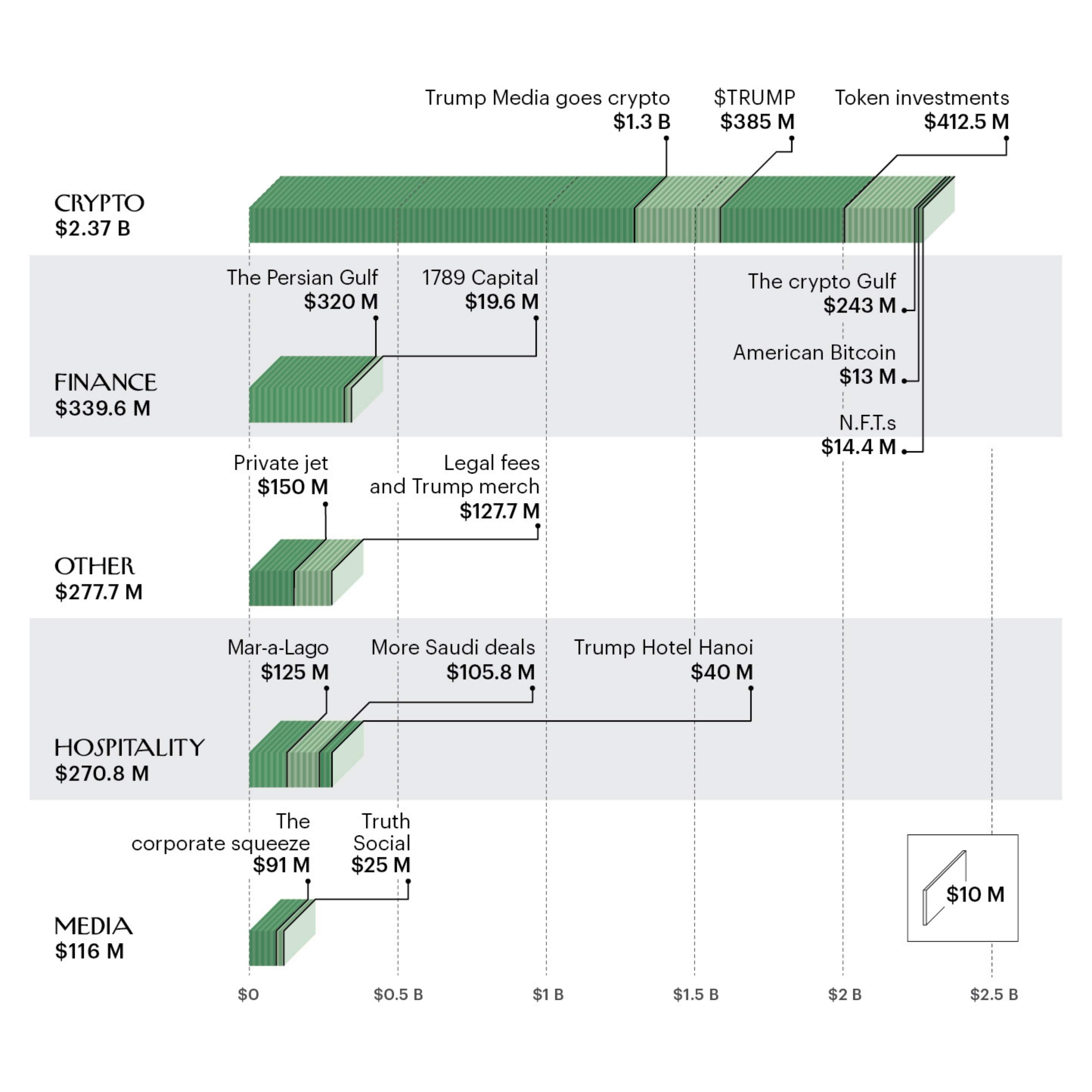Planet Money
Before President Donald Trump’s first term, he was in a “tight spot” financially, according to New Yorker writer David Kirkpatrick. At the start of his second term, David says, Trump was in an “even tighter” spot. But after just six months into his second term, Trump’s financial situation started looking really good.
David has done a full accounting for what the family has been up to, and even using conservative estimates, David says Trump and his family have made almost $4 billion dollars “off of the presidency,” in just about a year.
Today on the show: we look at every new business and business deal and financial transaction that David says likely would not have happened if Trump wasn’t the president of the United States. And we stop at the most innovative ways Trump and his family have made all that.
Pre-order the Planet Money book and get a free gift. / Subscribe to Planet Money+
Listen free: Apple Podcasts, Spotify, the NPR app or anywhere you get podcasts. ??Listen to our playlist on Federal Reserve independence here.
Facebook / Instagram / TikTok / Our weekly Newsletter.
Today’s episode of Planet Money was hosted by Sarah Gonzalez and Mary Childs. It was produced by James Sneed, edited by Jess Jiang, and fact checked by Sierra Juarez. Robert Rodriguez engineered it. Alex Goldmark is our executive producer.
Learn more about sponsor message choices: podcastchoices.com/adchoices

-
Why do hospitals keep running out of generic drugs?
There’s something strange going on in hospitals. Cheap, common drugs that nurses use every day seem to be constantly hit by shortages. These are often generic drugs that don’t seem super complicated to make, things…
-
Romance on the screen and on the page: Two Indicators
On today’s show, we have two stories from The Indicator, Planet Money‘s daily podcast. They just launched Love Week, a weeklong series exploring the business and economic side of romance. First, hosts Wailin Wong and…
-
The Subscription Trap
Over the past two decades, there’s been a sort of tectonic economic shift happening under our feet. More and more companies have switched from selling goods one by one to selling services, available as a…
-
We asked 188 economists. And the survey says…
(For our story on this year’s Nobel in Economics, check out our daily show, The Indicator!) Let’s face it. Economics is filled with terms that don’t always make sense to the average person. Terms that…
-
So imPORTant: Bananas, frogs, and… Bob’s??
Even in our modern world with planes and jets and drones, the vast majority of goods are moved around the planet in cargo ships. Which means our ports are the backbone of our global economy.…
-
Can cap and trade work in the US?
Recently, the state of Washington embarked on an ambitious new plan to combat climate change. Taking a page from economics textbooks, the state instituted a statewide “cap and trade” system for carbon emissions. The state…
-
What’s up with all the ads for law firms?
The lawyer commercial is almost an art form unto itself. Learned practitioners of the law doing whatever it takes to get your attention, from impressive dirt bike stunts to running around half naked. All so…
-
How Venezuela imploded (update)
(Note: A version of this episode originally ran in 2016.) Back in 2016, things were pretty bad in Venezuela. Grocery stores didn’t have enough food. Hospitals didn’t have basic supplies, like gauze. Child mortality was…
-
What’s THAT got to do with economics?
“Wanna see a trick? Give us any topic and we can tie it back to the economy.” That is the bold promise in Planet Money‘s tagline. And we believe the show does live up to…
-
Veep-onomics
Next week, JD Vance and Tim Walz will face off in the only confirmed vice presidential debate ahead of the election. As voters look ahead to what their economic policies might be, we look back…
